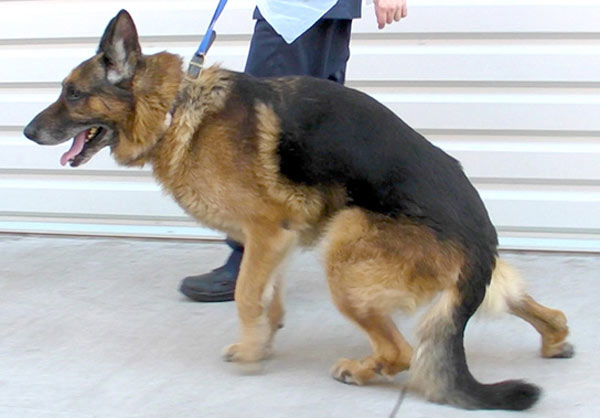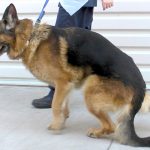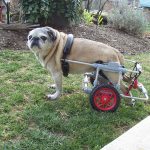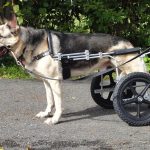To put it simply, Degenerative Myelopathy is a disease that progresses mainly in older, larger dogs that ends in quadriplegia. It is the degeneration of the white matter of the spinal cord. This white matter contains fibers that transmit movement commands from the brain to the limbs and sensory information from the limbs to the brain. Eventually this disease starts to degrade these fibers, making movement physically impossible.
Symptoms of DM:
DM commonly starts presenting with signs of overall weakness, usually the hind limbs. This can progress to paralysis of hind limbs, and may eventually affect the front limbs as well. Common signs include: difficulty rising, generalized ataxia, and hind limb atrophy, and will result in worn nails, and knuckling/scuffing of the hind feet. Since these symptoms can be attributed to many other illnesses, so it is imperative to seek a proper diagnosis from a veterinary specialist.
Diagnosing and testing for DM:
Though the only way to truly prove DM is to perform a necropsy, there are a couple of techniques that can point to a DM diagnosis, the most expensive being an MRI of the spinal column, performing a myelography, and the newest diagnostic tool, DNA testing. This can be done through your veterinarian, or through certain websites online, but be sure to check the website credibility, and whether or not they will test your breed for the SOD1 genetic mutation.
Treatment and Prognosis:
There is no “cure” for DM, however there are options for drawing out the process of this disease, giving the animal a longer, happier life. Forms of disease management include: nutricutical/ pharmaceutical management, and a strong rehabilitation program combined with a regular @ home exercise program; the earlier you start the better. Patients will eventually require use of a wheel chair to assist with mobility after rear paralysis.
While the prognosis of this disease is not good by any means, it is important to note that the onset and degeneration caused by this disease are not painful to the animal, however this is not to say that they will not have a hard time to adjusting to their new limitations. DM is an irreversible, unstoppable disease, but with proper management and acknowledgement, your dog can still live a happy life while living with this ailment.








